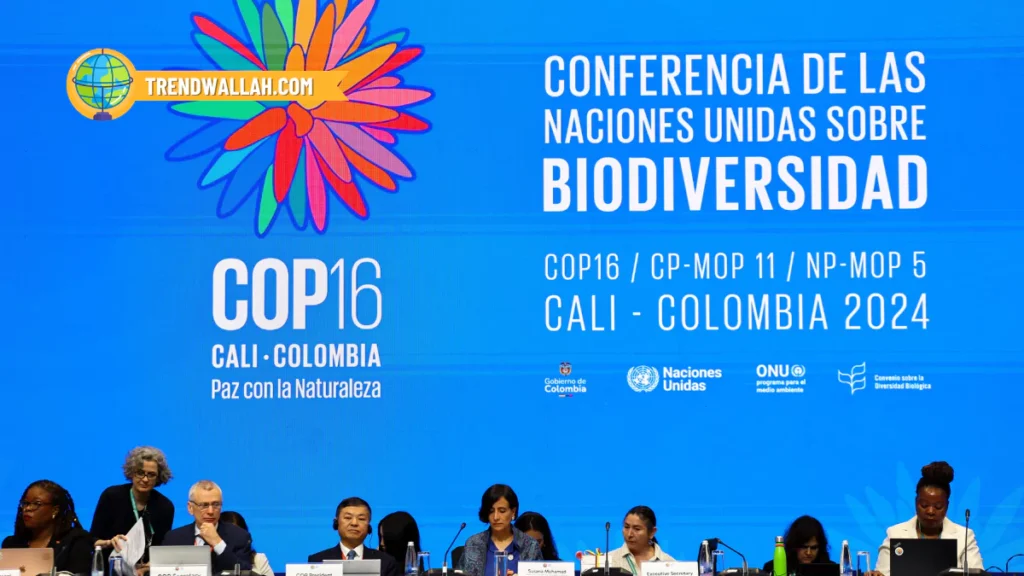
The United Nations Biodiversity Conference (COP16) commenced today in Colombia, gathering environmental leaders from nearly 200 countries. The focus of this two-week event is to assess the progress of the Kunming-Montreal Global Biodiversity Framework, an ambitious global treaty signed by 196 countries to protect and restore biodiversity.
Key Focus Areas of COP16
- Kunming-Montreal Global Biodiversity Framework
- The central theme of COP16 is to review the implementation of this global treaty. Countries are expected to showcase their National Biodiversity Strategies and Action Plans (NBSAPs) aligned with the framework.
- Participation and Representation
- Delegates from nearly 200 countries are attending the event to share strategies, discuss challenges, and propose solutions for biodiversity conservation.
- Objectives of the Conference
- Discussions will cover topics such as setting aside 30% of territories for conservation, reducing harmful subsidies, and ensuring mandatory environmental reporting by businesses.
Main Goals of COP16
| Objective | Details |
| Review Implementation | Assess global progress on the Kunming-Montreal Framework |
| Strengthen Monitoring | Develop better systems for monitoring biodiversity preservation |
| Finalize Digital Sequence Information | Create a fair sharing mechanism for genetic resources |
| Encourage Sustainable Practices | Promote policies to reduce environmental harm by businesses |
| Increase Conservation Efforts | Commit to conserving 30% of land and water by 2030 |
Conference Goals and Discussions
- Review of Biodiversity Commitments
- Delegates will evaluate their progress in meeting biodiversity targets set in the 2022 framework, including efforts to protect natural habitats and species.
- Strengthening Biodiversity Monitoring
- COP16 aims to enhance the monitoring systems to track global biodiversity, ensuring the goals of the Kunming-Montreal Framework are met efficiently.
- Equitable Sharing of Genetic Resources
- One of the significant tasks is to establish a multilateral mechanism for the fair and equitable sharing of benefits derived from the use of digital sequence information.
Opening Remarks at COP16
Colombia’s Environment Minister, Susana Muhamad, who is also the President of COP16, highlighted the importance of this gathering. She emphasized that COP16 offers a platform for global collaboration, where countries can share their unique experiences to promote stable and sustainable futures. Executive Secretary Astrid Schomaker also stressed that COP16 outcomes are crucial to accelerating actions at all levels for biodiversity conservation.
About the United Nations Biodiversity Conference
The UN Biodiversity Conference is a meeting of nations that are part of the Convention on Biological Diversity (CBD). Adopted during the Rio Earth Summit in 1992, CBD focuses on three main goals: the conservation of biodiversity, sustainable use of biological resources, and equitable sharing of benefits derived from biodiversity. The convention has 196 member countries, making it one of the most globally inclusive environmental agreements.
News Summary
- COP16, the United Nations Biodiversity Conference, began in Colombia.
- Focus is on the Kunming-Montreal Global Biodiversity Framework signed by 196 countries.
- Countries will review their National Biodiversity Strategies and Action Plans (NBSAPs).
- The conference aims to enhance biodiversity monitoring and finalize rules for sharing benefits from genetic resources.
- Nearly 200 countries are participating in discussions to promote sustainable practices and protect natural habitats.
- Opening remarks emphasized the importance of global collaboration and accelerated action.
Also Read Latest Current Affairs 2024
COP16 is the 16th United Nations Biodiversity Conference focusing on reviewing global efforts to protect biodiversity.
It is a global treaty signed by 196 countries to address the rapid loss of biodiversity and protect ecosystems.
Nearly 200 countries, including environmental leaders and policymakers, are attending COP16 in Colombia.
The conference aims to review the implementation of biodiversity strategies, improve monitoring systems, and finalize rules for the fair sharing of genetic resources.
CBD focuses on conserving biodiversity, promoting sustainable use, and ensuring fair benefits from biodiversity resources.
The CBD was adopted at the Rio Earth Summit in 1992.
NBSAPs are plans developed by each country to align their national policies with the goals of the Kunming-Montreal Global Biodiversity Framework.

